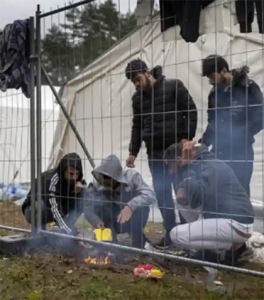Migration being weaponised by dictators
Migration is increasingly being used as a weapon by authoritarian governments seeking geopolitical advantage.
Recently Belarus was accused of helping thousands of Iraqi migrants and asylum seekers to fly into its capital, Minsk, and then ushering them into Latvia, Lithuania, and Poland.
 Lithuanian President Gitanas Nauseda has said that Belarusian autocrat Alexander Lukashenko is using migration as a weapon in an attack on the democratic world and particularly on the EU which imposed sanctions over the Ryanair hijack incident.
Lithuanian President Gitanas Nauseda has said that Belarusian autocrat Alexander Lukashenko is using migration as a weapon in an attack on the democratic world and particularly on the EU which imposed sanctions over the Ryanair hijack incident.
As a result, Latvia and Lithuania are now also resorting to questionable tactics to try to stop migrants and asylum seekers from entering their territory.
After arresting almost 300 people since early August, Latvia declared a state of emergency, allowing guards to use physical force to remove people without allowing them to apply for asylum.
Lithuania, which has seen more than 4,000 mostly Iraqi asylum seekers and migrants enter from Belarus this year, compared to only 81 in 2020, has also started pushing people back.
These responses are similar to Greece’s actions last year when Turkey opened its borders to put pressure on the EU.
In July, the European Union deployed an airship over the border between Turkey and Greece, an EU member state, equipped with radar and a thermal camera to help prevent another mass wave of migrants from the Middle.
With the Taliban in control of Afghanistan and possibly forcing Afghans to the West as a blackmail weapon, the EU wants to tighten one of its vulnerable borders.
The tactic of using migration as a weapon to cause difficulties in a democracy or to simply extort money is nothing new. In recent years, Cuba and Haiti used it against the United States.
But recently, Europe has seen an unprecedented use of so-called “demographic bombardment.” Russia, Libya, and have used it against Europe.
And in May, Morocco engineered an exodus of 6,000 people into Spain in retaliation for Madrid offering medical treatment to the leader of a group in Western Sahara that seeks independence from Morocco.
In early August, nine EU states sent a letter to the EU asking to end the “exploitation of migrants” as “geopolitical” blackmail.
“There is no doubt that if the European Union fails to collectively respond to this new tactic by third states. The problem will not just persist but could increase in scope and impact,” the letter said.
Europe is home to a tenth of the world’s population and a third of international migrants. Observers say this is because of its geography near Africa and the Middle East as well as its liberal democratic values.
In 2018, as a result of multiple issues around cross-border migration, the United Nations approved the Global Compact for Safe, Orderly and Regular Migration.
The Compact underpins a strategy is to help countries deal with the root causes of migration, protect migrants, and end the practice of “demographic bombardment”.
About 50 countries have signed up for UN assistance on migration and the UN has also taken an affirmative approach by lauding more than 20 countries as “champions” for improving their migration governance.
Tackling the reasons why people flee a country is the best way to address “migration weaponisation,” the Compact says.
But as more regimes exploit the inflows of people to harm other countries, there may be more works to do.












